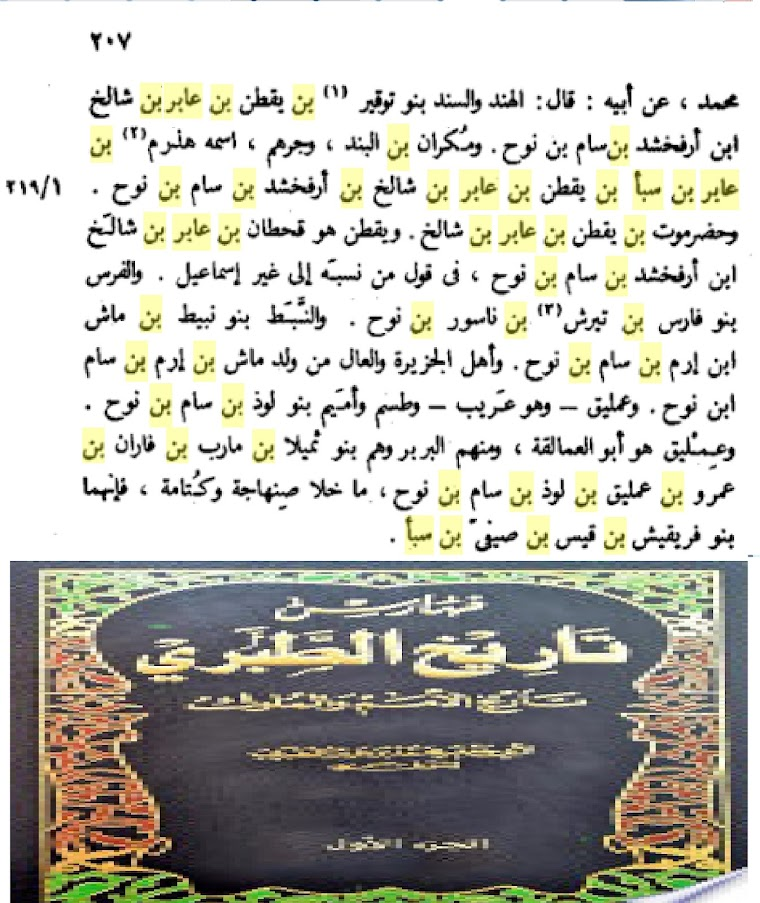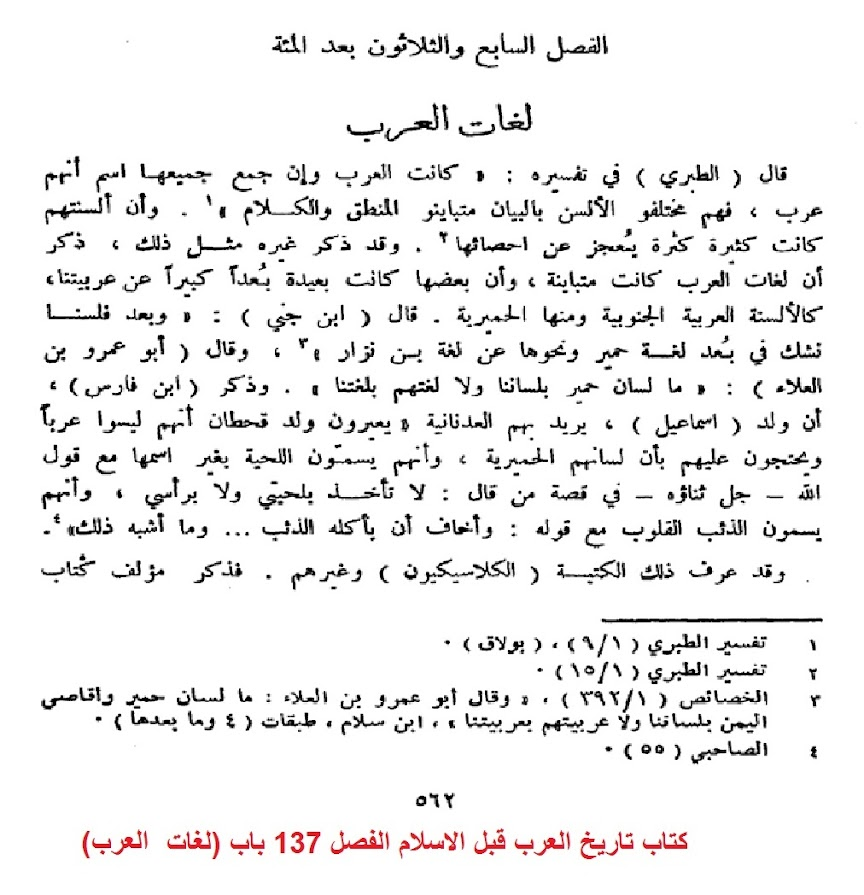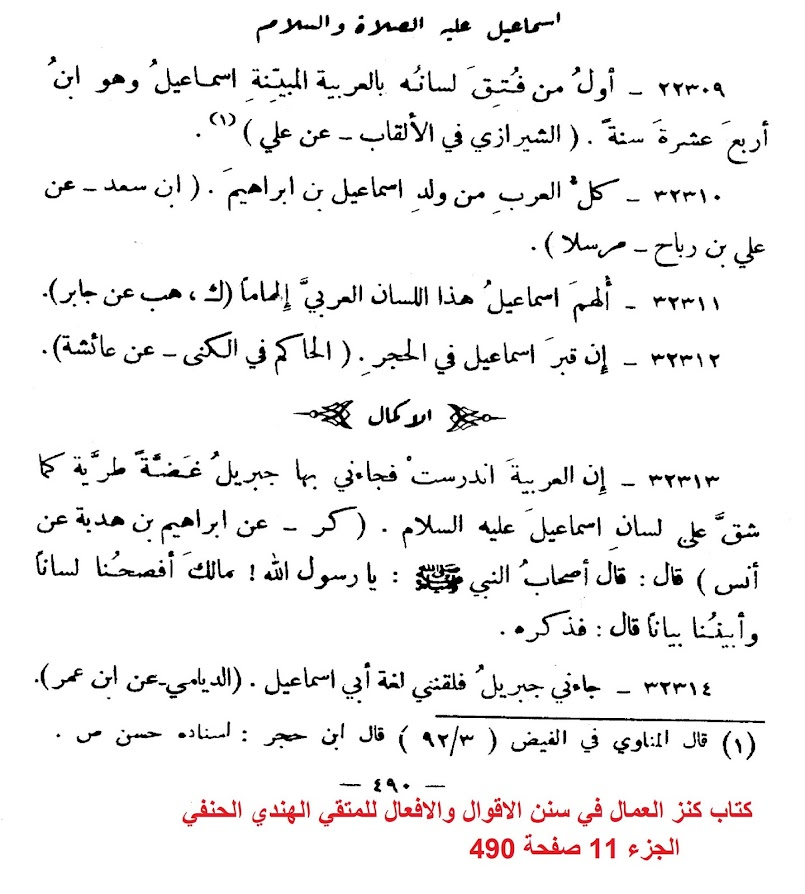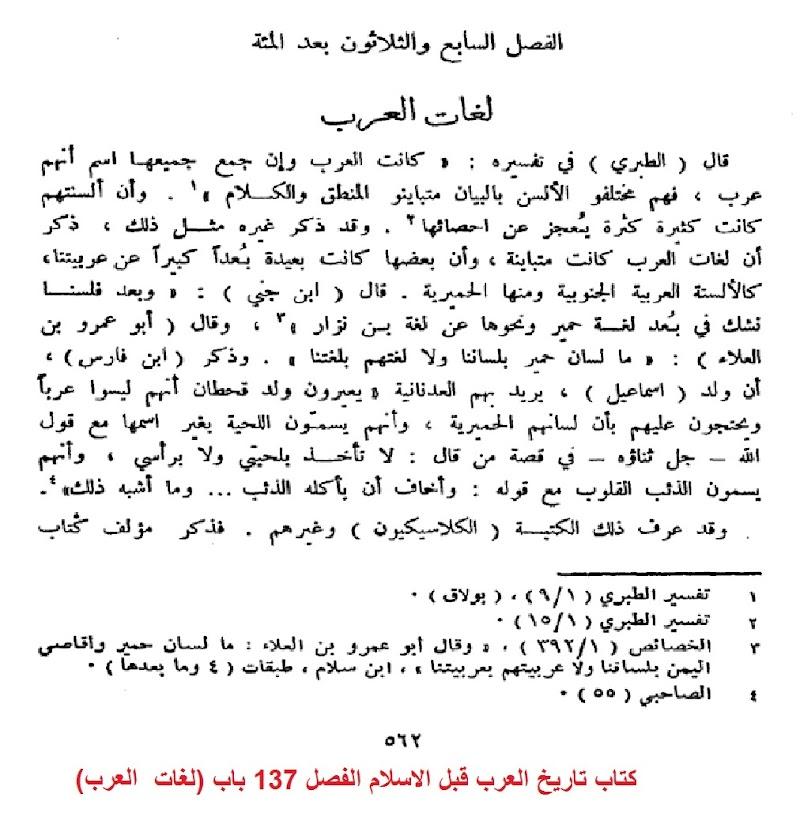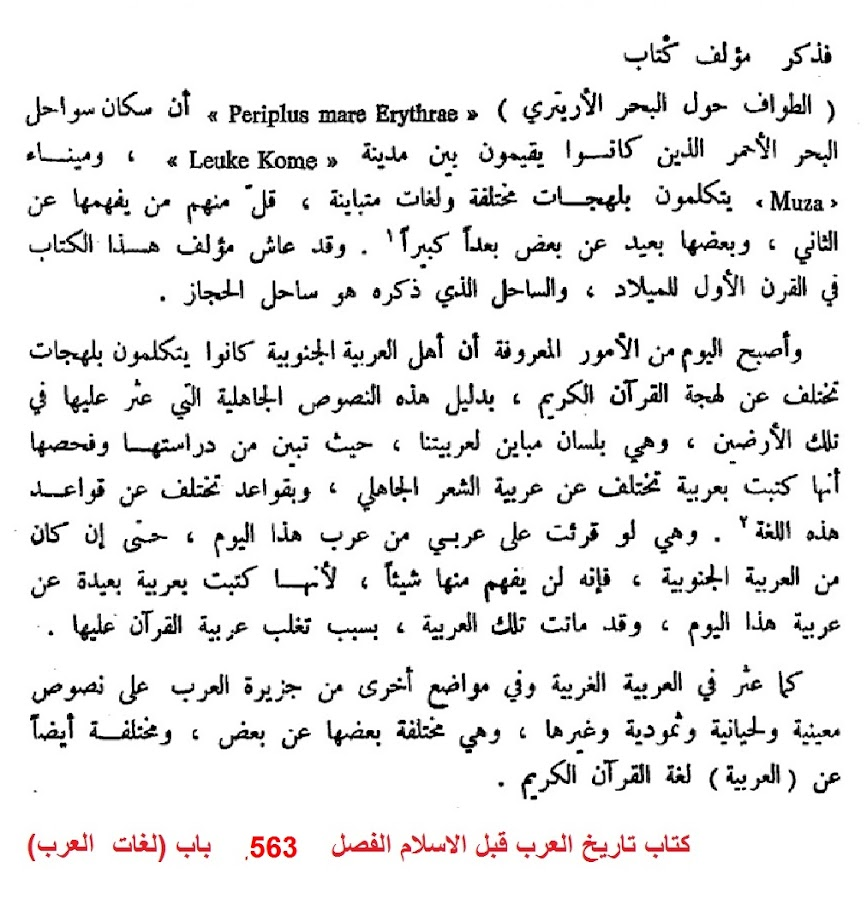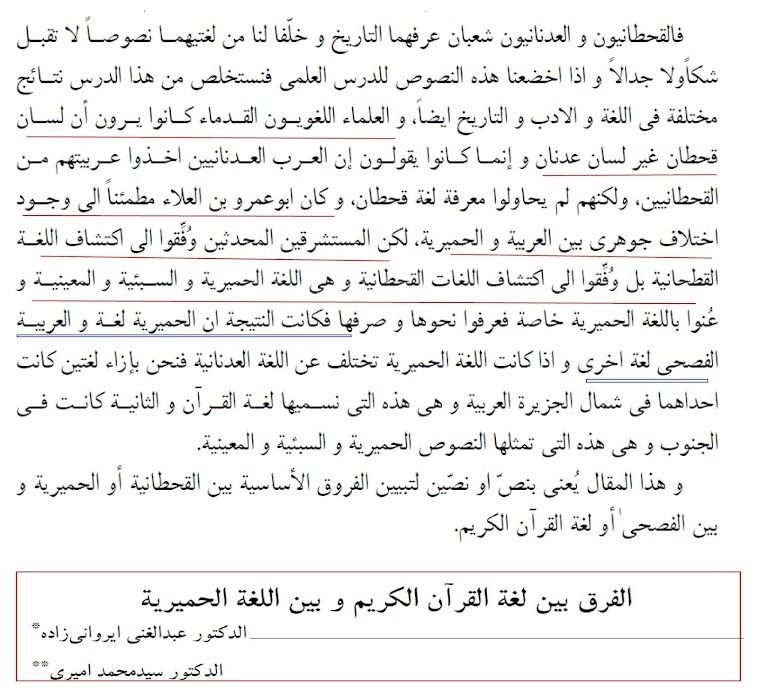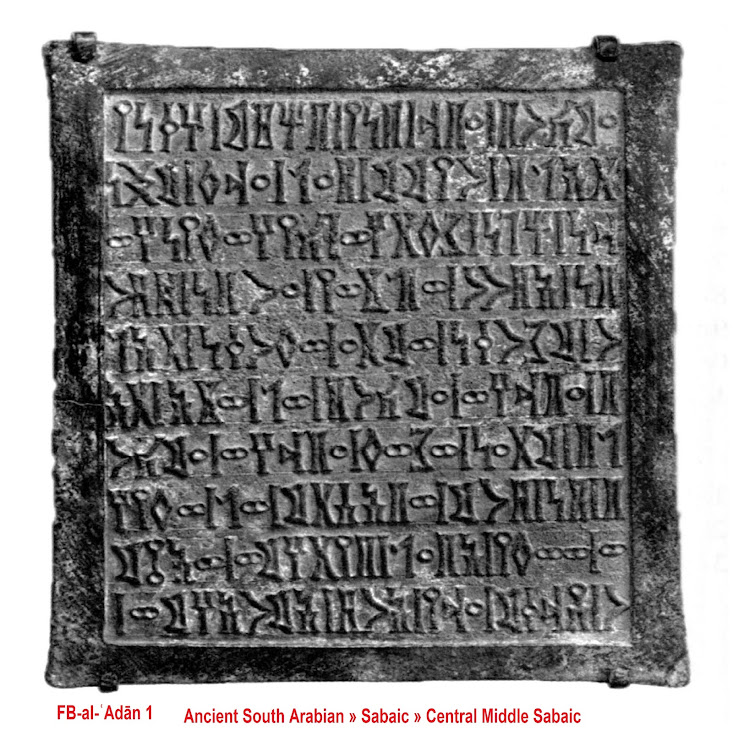Exposing the lies of Muhammad Jarboua Did you know Ismail, peace ?be upon him, Arabic from Jarham Al-Qahtaniyah Yemeni
Exposing the lies of Muhammad Jarboua Did you know Ismail, peace upon him, Arabic from Jarham Al-Qahtaniyah Yemeni?
Algerian researcher Mauloud Maamari says, " A scientific error can kill people, but a cultural error can kill generations."
Where the Arabized Qomji sect in northwest Africa promotes that the Berber language is its origin from the Yemeni language and that the Yemeni language is of Arabic origin, and so they tried and are trying to link the Tamazight to Arabic through malicious inaccuracies that have no origin in the academic references, but for their stupidity they do not know that the ancient Yemeni language is originally It is not Arab, so how can they say that the Amazigh language is Arab?
On August 31, 2022 AD, the Algerian poet Muhammad Jarboua, an impersonator of the Bani Tamim lineage, published an article in which he stated that Ismail, peace be upon him, learned the Arabic language from the Yemeni tribe of Jarham al-Qahtaniyah.
It was stated in an article by Mohamed Jarboua on Facebook that
Quoted from him
There is a storm of tampering with genealogy.. it will strike a lot of our heritage..
Take, for example, that the results of the genetic test say that the Qahtanis are also from Bani Ismail, peace be upon him, like the Adnanites, and accordingly the story of the Jurhum tribe that God led to Hajar and her son falls, and it is the tribe from which Ismail learned the Arabic language, and from which he married Mrs. Madad bin Amr al-Jarhami..
Article link
https://web.facebook.com/permalink.php?story_fbid=pfbid031jAHLjn2vu2oitQyVJVwiGqrsLE5acMG5WmE7VQdRpUNcAJkPAJu28VxNTk6atYel&id=100017390524914
For our part, we say to the poet Jarboua, Please Stop
There are two major inaccuracies in Muhammad Jarboua’s article, either intentionally, falsely, or ignorantly, and we hope that it is from the second case.
The first lie is his saying that Ishmael, peace be upon him, learned Arabic from Jurham
The second lie is his saying that genetics denies the separation of the Adnanite clans from the Qahtanian tribes, as is known in historical references.
Accordingly, the lies and ignorance of the poet Jerboua are exposed point by point
Today, the first lie was exposed
Ismael, peace be upon him, learned Arabic from the Yemeni Qahtani jarham
Exposing the false lie in saying that Ismail learned Arabic from their ?Yemeni jar
The saying that Ismail - may God’s prayers and peace be upon him - and his descendants were Arabized, and that they learned the Arabic language from the Yemeni tribe of Jarham Al-Qahtaniyah is a saying that was not said in the era of the early days of Islam and it was not transmitted to us that any of the Companions said it. Rather, it is a saying that came to us from the sayings of the People of the Book which It was transmitted by the Muslim Akhbaris, led by Ibn Jarir al-Tabari, whose reference was to the Akhbari Ibn al-Kalbi, who in turn ?brought his sources from the People of the Book from the Israelites
?Perhaps we know who Ibn al-Kalbi is
He is Hisham bin Muhammad bin Al-Sa’ib Al-Kalbi, better known as Hisham bin Al-Kalbi, who died in the year 204.
Ibn Hajar said about him in Lisan al-Mizan: “Hisham bin Muhammad bin Abu al-Mundhir al-Akhbari, the genealogist, the scholar, narrated on the authority of his father, Abu al-Mufsir, and on the authority of Mujalid, and a group narrated from him. A rejectionist is not trustworthy.”
And Al-Khatib Al-Baghdadi mentioned him in the History of Baghdad: “Abdullah bin Ahmed told us, he said, I heard my father say Hisham bin Muhammad. Whoever narrates from him is only a person of lineage and Samar, and I did not think that anyone narrated from him.”
For your knowledge , Ibn al-Kalbi, who is transmitted from the distorted Torah of the Jews, Ibn al-Kalbi invented the lineage of the Qahtans from the books of the Jews, and he was the first to suggest that a character residing in the Torah is the same Qahtan, the supreme ancestor to whom the Yemeni tribes are attributed, including the Jurhum and the Himyarites.
Reply to a lie (Qahtaniyah Arabic)
As for the opinion that contradicts the reality of the Ismaili origins of the Arabic language, which we will show you during this saying and in response to those who claim that Arabic is of Qahtani origin, his companions, like the poet Jerboa, rely on a hadith of a companion, which is the effect that Ibn Abbas, may God be pleased with them, narrated in Al-Bukhari
Hadith No. 3184 in which it says:
“The boy grew up and learned Arabic from them” (i.e. from the Jarham tribe)
And this narration that some cite as if it were a Qur’an does not come among his false words
. This saying is the saying of Ibn Abbas and not a saying of the Prophet, may God bless him and grant him peace. In this hadith or the long narration; It is a mixture between the words of Ibn Abbas and the words of the Noble Messenger, whereby Ibn Abbas is keen to purify all the sayings of the Prophet, may God bless him and grant him peace, by declaring before him by saying: (The Prophet, may God bless him and grant him peace), then he goes on to convey the news from others, then he transmits the saying of the Prophet, may God bless him and grant him peace. peace be upon him, and separates his words from the words of the Messenger and then goes on..and so on. Before this sentence, Ibn Abbas did not declare (and the boy grew up and learned Arabic from them) that it was from the saying of the Prophet, may God bless him and grant him peace, and this means that it is from the words of someone else, may God’s prayers and peace be upon him, or from His personal opinion, then, there is no room for presenting a report that was narrated by a companion of the Prophet, may God bless him and grant him peace. It is reported that the first person to speak Arabic was Ismail, peace be upon him, as mentioned in the authentic hadith
There is no good luck in the narration of Ibn al-Abbas between the words of the Messenger, may God bless him and grant him peace, and the words of the companion Ibn Abbas.
http://islamport.com/w/mtn/Web/3007/5865.htm
And to emphasize once again that the narration mentioned by Ibn Abbas is not all of the Messenger, peace and blessings be upon him, with the exception of some sentences that did not mention that Ismail learned Arabic from Jurham.
And whoever said that the Arabs are attributed to Ya`rub bin Qahtan , his response is that the first person to speak Arabic was Ya`rub bin Qahtan, and this is false! The bond on this saying is cut off? While the chain of transmission in the authentic hadith of the Prophet is that the first person to speak Arabic was Ismail bin Ibrahim, peace be ?upon them
It was mentioned in Sahih Al-Jami’ 2581 from the hadith of Ali bin Abi Talib
“The first to herniate his tongue in the clear Arabic is Ismael, and he is fourteen years old.” Al-Albani, an authentic hadith
From this and others - as it will come - it becomes clear that the tongue of the Qahtanis, before the Prophet of God, Ismail is a Hebrew tongue, and that the statement that Jurhum, which was revealed in the sanctuary against Hagar and her son Ismail - peace be upon them - was in Arabic, is false and shameful speech from the ?right
Rather, it is historically correct that Jurhum was a Hebrew language, not Arabic
Ibn Khaldun said in his Tarikh, “As for Jurhum, their homes were in Yemen, and they spoke in Hebrew.” Volume
1, vol.
And what Ibn Khaldun - may God have mercy on him - held is correct
Quoted from the words of Ibn Khaldun in the Book of Lessons
. As for Jurhum, their homes were in Yemen, and they spoke in Hebrew. Al-Bayhaqi said: Ya`rb ibn Qahtan, when he conquered Ada over Yemen, took possession of it from their hands. Ibn Qahtan, so I knew him, and the ruler of Oman resides in Ibn Qahtan. The words of al-Bayhaqi ended, and it was said that Jurhum al-Hijaz was revealed. Then he built Qutour bin Karkar bin Amalek for Qaht that hit Yemen. from him until Khuza’ah and Kinana overcame them, and Jurhum left Mecca, and they returned to their homes in Yemen until they perished.
Link to Ibn Khaldun's book
https://al-maktaba.org/book/12320/864
And what Ibn Khaldun - may God have mercy on him - went to is correct, as it was mentioned in al-Tabaqat by Ibn Saad with his chain of transmission
Ismail bin Abdullah bin Abi Uwais Al-Madani told us, he said: My father told me on the authority of Abu Al-Jarud Al-Rabee’ bin Quzba’ on the authority of Uqbah bin Bashir that he asked Muhammad bin Ali who was the first to speak Arabic. The people before that, O Abu Jaafar, said the Hebrew: “Uh!
See the book of the major layers, Line Saad, part one, page 50
http://islamport.com/w/trj/Web/2947/32.htm
The term “Hebrew” or “Hebrew” was used around the second millennium BC, and before that on a group of Arab tribes in the north of the Arabian Peninsula in the desert of the Levant and on other Arab nations in the region, until the word “Hebrew” became synonymous with the son of the desert or The Badia in general, and in this sense the word (Al-Abri), (Al-Habiri), (Al-Khubiru) or (Al-Abiru) appeared in the cuneiform and Pharaonic sources. The Jews are of Hebrew nationality
The ratio of their jars in most of the ancient Arab sources is
Jarham bin Qahtan bin Aber bin Shalekh bin Arfakhshad bin Sam bin Noah.
And the Hebrew tongue is a reference to Eber bin Shalekh, from whom the Children of Israel came, and that is why they also call them the Hebrews
Muhammad bin Jarir al-Tabari and others said that Abraham - peace be upon him - spoke in Hebrew when he crossed the river, so he deserted Nimrod and said to those he sent behind him, “If you find a young man speaking in Syriac, bring him back.
See for example
Ibn Jarir al-Tabari's book, part one
Ibn Khaldun says, “In the Torah,
(Aber was born to two children, they are an adult, and he lives, and according to the investigators of the lineage, he lived like Qahtan, his Arab cart.)
Ibn Khaldun’s words ended.
If Qahtan was an Arab, then why is he Arabized from the Arabs? Is this not evidence that the Qahtans are not Arabs?
See the Book of Lessons by Ibn Khaldun on the following link
https://al-maktaba.org/book/12320/847
In addition, the names of the sons who reside in “Qahtan in Arabic” in the Torah, which were transmitted by the genealogy of the Arabs, are Hebrew names, Ibn Khaldun says in his Tarikh
“Al-Makhthir, Ma’ribah and Madad, and they are Jarrah and Iram, and they are presence and Salaf, and they are the people of the Salaf and Saba, and they are the people of Yemen, from Himyar, the Tab’ah, the Kahlan and Hadramawt, and they are Hadramawt. In Barah, Ozal, Defla, Othal, Avimael, Euvhir, Hawela, Yophaf, and according to the genealogists, if they were dragged by a son who lived, I do not know which of them are.
Ibn Khaldun’s words ended
with this and others - as it will come - it will be clear that the tongue of the Qahtanis, before the Prophet of God Ismael is a Hebrew tongue, and that the statement that Jurhum, which was revealed in the sanctuary against Hagar and her son Ismail - peace be upon them - was in an Arabic language, is false and dishonorable.
We all know that the Arabian Peninsula in the past was a group of nomadic Bedouin tribes of several races roaming its outskirts, and Ismail, peace be upon him, descended among them alone, and he is the supreme ancestor of all the Arab Adnanite tribes, where he descended in the arms of the Jarham Al-Qahtaniyah tribe.
Allah says
{Our Lord, I dwells from my offspring with a valleys that are not when you are forbidden at your forbidden house, may God bless the prayer, so make the hearts of the people who love them and give them to them.
We know that Ismail, peace be upon him, is the father of the Adnanite Arabs, or as the Arabs are called, as he is the first to speak the Arabic language, which was revealed to him when he was three or ten years old, according to the narrations and hadiths of the Prophet agreed in their authenticity. Al-Jazeera has several languages that have nothing to do with Arabic, especially in the areas of Yemen and the Sultanate of Oman, where the Himyarite language until the 4th century AD was dominant in those places.
Some companions from Yemen were still speaking the Himyarite or Abyssinian dialect in the early days of Islam, such as Abu Huraira
Al-Tabari said in his interpretation:
“The Arabs, although all of them are plural, they are Arabs, so they differ in tongues in eloquence, differing in logic and speech.
And that their tongues were so many that it was impossible to count them, and others mentioned that, he mentioned that the languages of the Arabs were varied, and that some of them were a great distance from our Arabic, such as the southern Arabic tongues, including the Himyarites.
Ibn Jinni said:
After that, we do not doubt that the language of Himyar and the like is far from the language of Bani Nizar .
Abu Amr bin Al-Ala said:
“The tongue of a donkey is not in our language, nor is their language in our language.”
It was mentioned by Ibn Faris.
The sons of "Ismail", he means by them the "Adnaniya" they reproach the sons of Qahtan that they are not Arabs and protest to them that their tongue is Himyarite,
Abu Amr bin Al-Ala said:
The tongue of donkeys and the ends of Yemen is not in our language, nor is their Arabic in our Arabic.”
Al-Qahtanis or Yemenis are not Arabs, and their language has never been Arabic, and they do not call themselves Arabs
The Yemenis did not speak Arabic
There are many hadiths narrated on the authority of the Prophet, may God bless him and grant him peace, that the first person to speak Arabic was Ismail, peace be upon him, at the age of 13 years.
A hadith from the path of the Shiite imams
01 / In (Majma’ al-Bayan) by al-Tabarsi on the authority of al-Baqir, may God be pleased with him:
(Ismail was the first to split his tongue in Arabic, and his father used to say to him, while they were showing the house: O Ismail! Bring a son (and in some versions: Happy Ibn) meaning: Give me a stone, and Ismail says to him in Arabic: Oh, father! Here is a stone. (Majma` al-Bayan 1: 388).
02/ Ibn Saad (d. 230) narrated with his chain of narrators in Tabaqat al-Kubra when Ismail, peace be upon him, was mentioned by saying:
Ismail bin Abdullah bin Abi Uwais Al-Madani told us, he said my father told me on the authority of Abu Al-Jarud Al-Rabee’ bin Quzba’ on the authority of Uqbah bin Bashir that he asked Muhammad bin Ali who was the first to speak Arabic. Ismail bin Ibrahim said, may God bless them both, when he was thirteen years old.
A hadith from the Sunnis:
03/ The first to herniate his tongue in Arabic is Ismael, when he was fourteen years old.
The graduation of Al-Suyuti (Shirazi in the titles) on the authority of Ali.
Al-Albani’s investigation (Sahih) See Hadith No. 2581 in Sahih Al-Jami’ Al-Sagheer.
Al-Shirazi said in the Book of Titles:
Ahmed bin Ismail Al-Madani told us, Muhammad bin Ahmed bin Ishaq Al-Mashi told us, Muhammad bin Jaber told us, Abu Yusuf bin Al-Sakeet told us, Al-Athram told me on the authority of Abu Ubaidah, on the authority of Mas`ama bin Abdul-Malik, on the authority of Muhammad bin Ali bin Al-Hussein, on the authority of his forefathers, may God Almighty be pleased with them all, on the authority of the Prophet, may God’s prayers and peace be upon him The Prophet, peace and blessings be upon him, said:
(The first to herniate his tongue in clear Arabic is Ismail, peace be upon him, when he was fourteen years old).
This is also confirmed by the Sunnis
See Sahih al-Jami al-Sagheer and its additions, Part 01, page 504, Hadith No. 2581:
Read Sahih Al-Jami at the following link (the comprehensive library website)
http://shamela.ws/browse.php/book-10757#page-442
Download the book at the following link:
https://ia801602.us.archive.org/16/items/FP25484FP/25484.pdf
The hadith was mentioned by al-Hafiz Ibn Hajar al-Asqalani, and he is one of the greatest scholars of hadith. He said that it is a good hadith
Also, according to the Sunnis, the affirmation was mentioned in the book “Kinz Al-Amal in Sunan Sayings and Actions” by Al-Muttaqi Al-Hindi Al-Hanafi: Part 11, page 490. Link to download the book:
https://ia802606.us.archive.org/1/items/WAQ28869_201406/kaom11.pdf
A picture from the book Treasure of Workers by Al-Muttaqi Al-Hindi Al-Hanafi:
The first person to speak Arabic on earth and the first to write in Arabic on earth was Ismail, peace be upon him, and the evidence is also an authentic hadith of the Prophet Muhammad, may God bless him and grant him peace, as it came in the Mustadrak book of the two Sahihs by Imam Al-Nisaburi.
Part Two (Beirut Scientific Books Edition)
Chapter (Book of History of the Forerunners of the Prophets and Messengers) mentioned by Ismail bin Ibrahim, may God’s prayers be upon them / page 602
Hadith No. 4083:
(Al-Hussein bin Al-Hassan bin Ayoub told us, Abu Yahya bin Abi Maysara told us, Ibrahim bin Al-Mundhir Al-Hazzami told us, Abdul Aziz bin Imran told me, Ismail bin Ibrahim bin Abi Habiba told me, on the authority of Dawad bin Al-Husain, on the authority of Ikrimah, on the authority of Ibn Abbas, may God be pleased with him, he said
The Messenger of God, may God’s prayers and peace be upon him, said: ((The first to pronounce in Arabic and put the book according to his pronunciation and logic, then he made one book like In the name of God, the Compassionate, the Merciful, the Connector until his son Ismail bin Ibrahim, may God’s prayers be upon them both, separated him)).
Link to the book (Al-Mustadrak on the Two Sahihs) by Imam Al-Naysaburi, may God have mercy on him:
https://ia600304.us.archive.org/3/items/waq66017/02_66018.pdf
A copy of the book of the two Sahihs:
Also in al-Mustadrak on the two Sahihs [p.: 227]
Interpretation of Surat Ham Al-Sajdah there Hadith:
1423 - (Ismail inspired this inspirational Arabic tongue)
And this is understood from him that he was the first to speak Arabic
3693 - told me Abu Al-Hasan Ahmed bin Al-Khader Al-Shafi’i, told us Abu Ishaq Ibrahim bin Ishaq Al-Aqili, told us Obaid Allah bin Saad bin Ibrahim Al-Zuhri, told us my uncle, my father told me, on the authority of Sufyan Al-Thawri, on the authority of Jaafar bin Muhammad, On the authority of his father, on the authority of Jaber, may God be pleased with him, that the Messenger of God, may God’s prayers and peace be upon him and his family, recited an Arabic Qur’an to a people who knew . Then the Messenger of God, may God’s prayers and peace be upon him and his family, said: “Ishmael inspired this tongue with inspiration.” " This talk is true attribution did not narrate .
https://islamweb.net/ar/library/index.php?page=bookcontents&flag=1&bk_no=74&ID=3511
The Hamyar tribe of Yemen belongs to the same origins as the Jarham Al-Qahtaniyah tribe
Himyar bin Saba bin Yishbab bin Yarub bin Qahtan bin Aber bin Shalekh bin Arfkhashad bin Sam bin Noah, peace be upon him
See the book “Akhbar al-Zaman” by Masoudi, p. 102, and al-Samani’s book, vol. 3, p. 96, and al-Kamil fi al-Tarikh, by Ibn al-Athir al-Jazr al-I, p. 176.
Important note:
The language of the Qahtaniya donkeys, of which Jurhum, who lived with Ismail, peace be upon him, is not Arabic. This is what the two of them do not disagree on. They had a special language that scholars call “Hamiria.” A little before Islam, and Arabization continued and spread after Islam, as Ibn Khaldun mentioned that Bani Ismail expelled Jurham and returned to the country of Yemen
. Some of the Himyarites from Mahra in Dhofar still speak their Himyarite language. Go there. You will need an interpreter to communicate with them.
https://www.youtube.com/watch?v=k_POAEq14B8
How could the language of Jurhum be Arabic before the Prophet of God, Ismail bin Ibrahim, peace be upon them, and Ismail is the first to ????speak Arabic and write it
Is it conceivable that there were Arabs before Ishmael who did not know Arabic??!!!!!!! And Ismail was and died in Makkah Al-Mukarramah in the west of the Kingdom of Saudi Arabia, and he was the one who never set foot in Yemen!!!!!! And he built with his father Ibrahim the Kaaba in the Hijaz, and from his crucifixion came the Adnanites, the heirs of Arabism.
The Arab Arabs are the sons of Ismail, peace be upon him, and only he is the first to speak Arabic, not the Yemeni tribe of Jarham Al-Qahtaniyah:
Ismail, peace be upon him, when he came with his father Ibrahim Al-Khalil, he did not speak Arabic, nor did his father Ibrahim Al-Khalil Aramaic, whose language was Syriac, and he is the father of the Israelites and Abu Adnanites
Abraham, peace be upon him, was not known in Arabic, and there was no such thing as Arabs at his time. The Arab identity did not appear until after the appearance of the Prophet Ismail, peace be upon him, and he is the father of the Arabs and the Adnanites from his descendants. In fact, they are the only ones who may be called Arabs.
Al-Suyuti said: Ibn Saad narrated on the authority of Ali bin Rabah Al-Lakhmi who said: The Messenger of God, peace and blessings be upon him, said:
( All Arabs are from the descendants of Ismail) despite the weak chain of transmission for the hadith (one narrator) according to some scholars and jurists, especially those who are not from the Adnanites, but there are those who It supports its body and its content, which is closer to authenticity, and they are many scholars and Sunni imams, especially since it agrees with other hadiths of the same meaning, which are authentic in chains and text.
Note
as it is known in the science of takhrij, not every hadith with a weak chain of narrators is necessarily weak in the text, and modern scholars cite a weak hadith when the chain of transmission is repeated.
If the hadith is weak in its chain of narrators, and it is not in a weak text, then it is permissible to rely on it with other authentic hadiths
For example:
Muhammad (may God’s prayers and peace be upon him) says : “
All Arabs are from Bani Ismail, except for the Salaf, Al-Awza’, Hadramawt and Himyar.”
Also look at the same hadith narrated in different ways in the book Umdat Al-Qari, Sharh Sahih Al-Bukhari by the Sunni Imam Mahmoud bin Ahmed Al-Ayni from the 755th century AH.
Explanation of meanings
The ancestors are the vanished Arabs that inhabited the Arabian Peninsula, such as the Nabataeans and the people of Hud and Saleh. As for the Awza’, they are the people of the mountains of Yemen, the upper, as for Hadramawt, they are the Hadhramauts, the inhabitants of the Hadhramaut region in Yemen today, and the donkeys are the Ajami people from the descendants of Qahtan Al-Ajami, the Arabized Hebrew, and they live today in the mountains of the governorate Dhafar in the Sultanate of Oman, and their Himyarite language is still spoken among them to this day!!!
(Al-Suyuti / page 113)
See also the hadith in the Great Book of Tabaqat of Imam Al-Zuhri, who died in 230 AH
There are other authentic hadiths that state that the tribes of the Adnanites, such as the Quraish and Rabi’ah, are true Arab Arabs, for example:
On the authority of Ibn Abbas, may God be pleased with him; The Messenger of God, may God bless him and grant him peace, said:
“The first Arabs to perish were Quraish and Rabi’ah . ” They said: How? He said: "As for the Quraysh, the king will destroy them, and as for Rabia, the zeal will destroy them."
Narrated by Ibn Abi Shaybah .
All of these hadiths indicate that the Messenger, peace and blessings be upon him, the Quraish, Banu Hashim, and the Adnanites in general are the true Arabs, and they are the first to speak Arabic, not the Yemeni Qahtanis, as the poet Muhammad Jarboua claims, and the Arab nationalists who are trying to Arabize Yemen falsely.
These multiple narrations and news reinforce each other and show two important things:
The first matter: that the Arabic language is inspired or inspired by God Almighty, and it is not created by humans and is not an invention of the Arabs.
The second matter: that the first person who spoke the Arabic language was the Prophet of God, Ismail bin Ibrahim Al-Khalil (peace be upon them).
The third matter: The Arabs are only the sons of Ismail, peace be upon him, and he is the father of Arab nationalism
Historically:
Historians in the old testify that the true Arabs are the Bani Ismail and they are the Adnanites and that they are the owners of the Arabic language, while history testifies that the Qahtanis and the Yemenis in general did not speak Arabic at all.
See the book, History of the Arabs before Islam, chapter 137, chapter (Langut al- Arab).
See also on page 563 of the same book:
Important noteThe
language of the Qahtaniyah donkeys, of which Jurhum, who lived with Ismail, peace be upon him, is not Arabic. This is what no two people disagree on. They had a special language that scholars call “Hamiria.” (Mathhaj, Kinda, Hamdan) Shortly before Islam, Arabization continued and spread after Islam.
Some of the Himyarites from Mahra in Dhofar still speak their Himyarite language. Go there. You will need a translator to communicate with them. They are still present in Saudi regions. See the video
https://www.youtube.com/watch?v=EAcPbPBgm10
And this poem is in the language of the people of the Empty Quarter and has nothing to do with the Arabic language
Donkeys' language is hamira, and they still speak Baa'a to this day in the south of
the Empty Quarter. And the Sheba’s and in their original places, you do not understand
anything of what they say to this day
The language of donkeys has nothing to do with the Arabic language, and their language was not Arabic
This is what was said and confirmed by the historian and scholar, Imam Ibn Hazm Al-Andalusi, who died in 1064 AD, when he said in his book “Al-Ahkam Fi Usool Al-Ahkam” - Part One, page 31. donkey language
So there is no such thing as the South Arabic language, as some call it, because the languages of southern Arabia, including Himyarite, have nothing to do with Arabic, the language of the Qur’an, as indicated by the difference in the language of the
Qur’an from the Himyarite language, Dr.
The language of the Qur’an and the Himyarite language
Ibn Manzur (d. 711) mentioned in the book Lisan Al Arab
And a man entered upon one of the kings of donkeys, and the king said to him: Rise, i.e. sit, so he jumped and broke. The king said: We do not have an Arab. Whoever enters Dhofar is a donkey, meaning he spoke in Hamiri. "Uh?
Lisan Al Arab book, part two, the following link
http://shiaonlinelibrary.com/%D8%A7%D realt D8%B9%D8%B1%D8%A8%D8%A7%D8%A8%D8% B1-D8%AC-D9%A1/%D8%A7%D8%D8%B5%D8%AD%D8%A9_792
It was clear from these documented texts that the language of the Qahtanites and the general Qahtanites was not Arabic, just as the Muslim biographers used to call some of the Qahtaniyah tribes, with Arabism, such as the Jafna family known as the Ghassanids, so they are not pure Arabs but rather those who entered the Arabs and were ?Arabised
Al-Hafiz Abu al-Faraj Ibn al-Jawzi - may God be pleased with him - says in al-Muntazul with his chain of transmission: Muhammad ibn Abi al-Qasim told us, Ahmed ibn Ahmad told us, Ahmad ibn Abdullah al-Hafiz told us, Habib ibn al-Hasan told us, Muhammad ibn Yahya told us, Ahmed ibn Muhammad ibn Ayyub told us, Ibrahim ibn Saad told us, on the authority of Muhammad. Ibn Ishaq said: Muhammad Ibn Ja`far Ibn al-Zubayr told me on the authority of Urwa Ibn al-Zubayr who said: When the people prepared and prepared to go out to Mu`tah, the Muslims said: God accompanied you and defended you. Forgiveness and an empty blow that throws butter, or a stab in the hand of Harran, equipped with a spear that pierces the guts and the liver, so that they say, “If they pass by my dead body, God will guide you from a gas, and they are right.” Then they proceeded until they descended to the land of the Levant. From Lakhm, Juzam, Balqin, Bahra’, and Bali among a hundred thousand of them.”
The archeology of the Yemenis was neither Arabic nor Arabic writing
As it is said, archeology is the sweet enemy of Arab nationalist narratives and myths
Where the ancient inscriptions in Yemen did not show any presence of the Arabic language at all, but rather showed writing and a Yemeni Sabian tongue that has nothing to do with Standard Arabic, nor non-standard Arabic, nor the current Arabic writing.
When you see the inscriptions, you ask where is the Arabic, Muhammad Jarbou’
Among those Yemeni inscriptions of the Musnad is a picture, the word (Araben) is found in the inscription FB-al-ʿAdān 1 documented on the Dassi International Blog.
http://dasi.cnr.it/index.php?id=30&prjId=1&corId=0&colId=0&navId=618448802&recId=7532&mark=07532%2C004%2C007&fbclid=IwAR1C39kgxfcmgnG9eU8hbax_YXT_YU8hbaqST_Y
1 ʿmkrb ʿbd bny Bḥḍm hqny
2 Tʾlb Rymm bʿl ʿdf ms³n—
3 dn ḥg-n s²ft-hw k-yhwfyn-hw
4 bn ʾḍrr w-ġzwy ʿrbn ḏ- br—
5 r ms²rqn w-mtʿ w-frqn Tʿll—
6 bw ʿbʿb Tʾ—
7 lb mtʿn w-s²wf ʿbd-hw ʿmkr—
8 b bn ḍrm w-bʾs¹tm wl wfy-h—
9 w w-wfy ʾbʿl byt-hmw w-ʾṯm—
10 r ṣdqm ʿdy ʾrḍ ʾmrʾ-hm |
Look at the translation into Arabic letters. Is this an Arabic language, Hamad Jerboa? Is it not closer to Hebrew than Arabic? Why does the poet Jerboa not tell us that the language of the Children of Israel is Arabic? Does he not know that Hebrew is the closest language to ?Arabic
Try to read and understand this ancient Yemeni text Al-Qahtani if you claim that it is an Arabic language and you will not be able to do so until the sentences penetrate the poison of the tailor, so stop spreading your intellectual waste
1. Amkarab Abed Bani Badam Haqni
2. Taleb Ryim Baal Adaf Ms3n
3. Don't Dream
4. Ibn Abrar and Ghazzawi Arban Thattar
5. Bright, fun, and the next difference
6. B Amdho Amkarb and Waza Ta
7. Pulp hard and see Abdo Amkar
8. B Bin Dharm and Bastam Wal and them
9. And I will live in their house and have sinned
10. Don't believe Uday is the land of their mothers
Translating the text to translate the meaning into classical Arabic:
Uncle of the anguish of Abd Bani Bani Hudm presented to (The Deity) the stubbornness of Riam Baal (Temple) The affliction of this Musnad is a sacrifice of his vow because he was saved from the wars and invasions of the Arabs from the land of the East, and he saved and preserved the stubbornness of his servant, uncle of distress, and to perpetuate the stubbornness of his servant in the safety and survival of his servant uncle from misery and adversity and to grant him safety The safety of the masters of their clan (Bani Bahdhum) and the fruits of truthfulness in the land of their masters
important note:
The Yemeni inscription also talks about the attacks of the Arabs from the north of the Arabian Peninsula (the Adnanites) on the Yemeni city of Ma’rib and the Yemeni military commander’s defense of the city and repelling them and offering a vow of thanks to God Reem. He prevented the Arabs from invading him, and this archaeological evidence undermines any talk about the Arabism of the Yemenis and the Arabism of their ancient language.
This Yemeni inscription clearly shows that the Yemenis dealt in the old with the term Arabs and that they are a non-Yemeni nationalism
And in the end, we present to the poet a video jerboa representing a Yemeni poetic poem in the ancient Qahtaniyah language, or what is known as the Himyarite poem or the hymn of the sun.
Archaeologist Dr. Ali Al-Ghabban Al-Hijaz The origin of the Arabs and Yemen are the origin of the Arabs, a lie
https://www.youtube.com/watch?v=VNYLNh6JZak
https://www.youtube.com/watch?v=VNYLNh6JZak
Thank you for the follow-up and stay tuned for another article that exposes the second lie. Muhammad Jarboua said that genetics denies the separation of the Adnanite tribes from the Qahtani tribes, as is known in the historical references.
General Note: What is mentioned in the topic is limited between truth and illusion:
1- The truth is that the Jarham tribe is not Arab, if it is proven that it is Yemeni and came from Yemen. Its language is Himyarite or Sabian
2- It is not possible for a person alone to create a new language regardless of his position, even if it is revealed to him. There is no meaning in its existence among a people who do not realize it. The language is gradually created as a dialect and in a period and successive periods and from the belly of a mother language and some languages of the neighboring peoples. It is not in the sight of humans as Sedge thought.
3- The issue of the expulsion of the sons of Ismail to the Jurhum tribe seems logically insufficient. They expelled their uncles who were comfortable with them, something unbelievable. The minority does not have the ability to expel the majority.. Even if we assume that they were actually expelled, what is the evidence for their return to Yemen? Perhaps they settled somewhere soon. in Mecca.
4- If Jurhum is Yemeni, but it is one of the nomadic tribes. Who knows, it might one day land among the Arab tribes and settle for a long time and learn their language? It is not strange for Ismail to learn Arabic from the Jurhum tribe. And who knows, perhaps Arab tribes came to Mecca after being dragged and settled there and learned Arabic The Arab tribes being the majority.
5- The topic is interesting, but it is not supported by scientific facts or rational and logical arguments, but rather depends on silly novels and interpretations. This topic needs academic studies to decipher the confusion, ambiguity and random interpretations of everyone who has been, and we rarely find a true novel, but most of the novels are false and unreliable because they cannot be trusted. It is not logical that a healthy mind cannot accept.
6- I do not defend the Arabs, nor their language, nor do I support the author of the original publication, nor Muhammad Jarboua, as long as the issue is subject to many interpretations and is questionable in the first place.
Source: Copied from the heritage of the Amazigh nation







